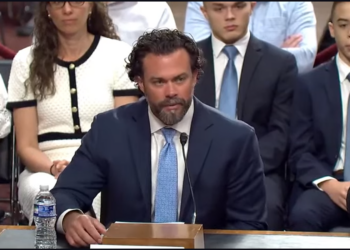The girls cleaned up at my (Brad’s) daughter’s middle school graduation in Virginia this month. Three out of four of the school’s top awards went to girls. A majority of the “President’s Academic Excellence Awards,” an award given to students who maintained an “A” average each semester throughout their middle school career, went to girls.
Boy-girl gaps such as this have drawn considerable attention in recent years. But the typical explanations for this gender gap have tended to overlook one important factor. We’ve heard about biological differences in boys’ and girls’ development. The addictive hold electronic gaming has on teenage boys. And, according to the American Psychological Association, the ways in which boys are socialized “to project an image of dominance, indifference, and self-sufficiency” that harms their capacity to do well in school.
What we have not heard much about, however, is what can be called the “father factor” — the ways in which boys with disengaged or absent fathers struggle more, while active and engaged fathers often protect boys from academic failure, as well as trouble in and outside of school.
To remedy this, we convened an ideologically diverse group of scholars to research the state of fatherhood here in Virginia. The result is a joint University of Virginia and Hampton University report, Good Fathers, Flourishing Kids: The Importance of Fatherhood in Virginia, which spotlights the ways in which boys (and girls) across the state are more likely to flourish in school and life when they have good dads.
When it comes to father presence, we find that 84% of boys from intact, father-present homes (where dads are married or cohabiting with moms) get mostly A’s or B’s in Virginia, compared to just 50% of boys from father-absent homes (where biological or adoptive fathers do not live in the home). Boys from intact, father-present homes also outperform girls from non-intact families, for whom just 62% get mostly A’s or B’s.
Likewise, when it comes to paternal engagement, there is no question that boys are less likely to experience problems at school when their dads are involved. Parents were much less likely to be contacted by schools for bad behavior or academic performance problems when boys’ fathers were more engaged, 35% to 22%, respectively. Moreover, the gap in school contacts related to paternal involvement was much bigger for boys (13 percentage points) than it was for girls (7 percentage points). There is no question that engaged dads are especially valuable in keeping boys out of school trouble.
Our findings in Virginia, then, are consistent with the idea that fathers increase the odds that boys do well academically in school and diminish the odds they end up in the principal’s office. They also suggest that policymakers — including leaders such as Govs. Glenn Youngkin and Wes Moore in states such as Virginia and Maryland who have indicated their desire to boost the fortunes of boys and men in their states — should take a cue from new, bipartisan efforts to promote fatherhood in Florida and Tennessee with initiatives of their own to boost the falling fortunes of boys and men by strengthening fatherhood in their states.
In Good Fathers, Flourishing Kids, we suggest that states could boost the fortunes of fathers and future fathers by making schools more boy-friendly: adding male teachers in schools, expanding recess time, and recalibrating school curricula to be more boy-friendly. Secondly, by launching PSA campaigns spotlighting the valuable role of fathers, so as “to motivate fathers to engage more with their kids, encourage moms to facilitate such engagement, and develop greater public appreciation for the role that dads play in the lives of their kids.” Finally, by incorporating programs such as “Parenting Inside Out” that help incarcerated dads prepare for the transition to family life once they are released from prison.
THE ‘BABY BONUS’ PARENTS REALLY WANT? DECENT SCHOOLS
Right now, slightly more than one in four children across Virginia and America live apart from their fathers. These children are clearly more likely to be struggling. To help them, and especially the boys who are falling behind on so many fronts in school and in life, it is time for state leaders, without regard to partisanship, to launch fatherhood initiatives across America.
Following in the footsteps of bipartisan initiatives in Florida and Tennessee, state leaders across the country should work to maximize the odds that all children benefit from the presence of an active and engaged good dad in their lives.
Brad Wilcox is distinguished university professor of sociology at the University of Virginia and a nonresident senior fellow at the American Enterprise Institute. Linda Malone-Colon, dean of Hampton University’s School of Liberal Arts and Education, is executive director of the National Center for Black Family Life at Hampton University.
















